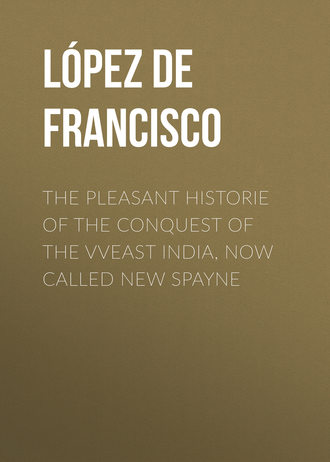 полная версия
полная версияThe pleasant historie of the conquest of the VVeast India, now called new Spayne
The Mariage of Cortez
When it was knowen in Spayne, that the lady Catherin Xuares, wife vnto Cortes, was deceassed in India, by intercessours he was assured vnto the Duke of Beiar, his brothers daughter, who was named the Lady Iane of Zuniga: hyr fathers name was Don Carolus de Arrellano, Earle of Aguilar. This Lady was a bewtifull Dame, and hyr brethrene noble personages, who were highly in fauour with the Emperour. And Cortes to matche with so honorable an house and lynage he iudged himselfe fortunate and well maried.
The riche EmeraldesAmong many Iewelles whiche Cortes broughte with him, were fiue moste riche and fine Emeraldes, whiche were valued at a hundreth thousande Duckets: the one was wrought lyke vnto a Rose, an other like a Cornet, an other lyke a fishe with the eyes of golde, whiche was a maruellous péece of worke, beyng wrought among Indians: an other péece was wrought lyke vnto a bell, with a great and a riche pearle for the clapper, garnished with golde, ingrauen about with letters, whiche sayde, Blessed is he that created thée. The fifth was made lyke a cuppe with the foote of gold, and had foure little chaynes of gold, that were ioyned all at the top togither, in a great pearle, and the brimme of this cuppe was of gold, with this verse ingrauen rounde aboute, Inter nates mulierum non furrexit maior. For this onely péece the Merchantes of Geneua did offer fourtie thousand Ducates, for to sel the same again to the great Turke. But at that tyme Cortes woulde not giue it for any money, although afterwarde he lost them all in the warres of Argel, beyng there with the Emperour. It was told Cortes that the Empresse desired to haue those péeces, meaning to demaunde them of him, and that the Emperour shoulde pay for the same, for whiche cause he sent them to the Lady his newe wife, with many other Iewelles before he came at the Courte, and there, when he was enquired for them, he answered, and excused himselfe, for then certaynely he gaue suche Iewels vnto his Espouse, that the lyke neuer Lady had in Spayne. And after he was maried to the Lady Iane of Zuniga, he departed with hyr to the newe Spayne, with title of Marques.
Hovv the Chancery vvas first placed in Mexico, and certayne Diuelishe pretences wrought against Cortes
Before Cortes his cōming into Spayne, Pamfilo de Naruaez his old enimy wēt vp & down in the Court, procuring the conquest of the riuer De Palmas & Florida, where at the laste he died, and alwayes when he saw time conuenient he made cōplaints against Cortes, yea and to the Emperours owne hand he deliuered a scrole of many articles, amōg the which was one, wherein he affirmed that Cortes had as many barres of gold and siluer, as in Biscay were barres of yron, and offered to proue the same: but although it was not true, yet it was suspicious. He also earnestly procured that he shold be punished, saying that he had plucked out one of his eyes, & killed with poyson the Licenciat Luys ponce de Leon, & Francisco Garay. Through his many and importunate petitiōs, it was determined to send to Mexico, Don Pedro de la Cueua, who was bothe fierce and seuere, and Lorde stewarde of the Emperour his house, and afterwarde made general of the ordinance, and chiefe Comendador of the order and knighthood of Alcantara, who findyng the accusation true, should cut off Cortes his head.
But as God would, in the meane season came the testimoniall from the Doctor Hoieda, and the Licenciat Pero Lopez, Phisitions, who had cured the persons that were reported to haue bene poysoned, whervpon that commission ceased. And when Cortes came into Spayne, Don Pedro de la Cueua would many times laugh and iest with him, saying, From farre places long lies.
Before the Iudges came, Cortez vvas gone to SpayneThe Emperour and his councell of India prouided a Courte of Chancery in Mexico, as chiefe place, where as all controuersies and matters of righte throughout the new Spayne mighte there be determined, and also to correct the mutinies, and partes taking among the Spanyardes: likewise to take residence and accompte of Cortes, and to be satisfyed both of his seruice and offences. Moreouer that they should visite the officers, and royall Treasorie there. Munio de Gusman was appoynted president and gouernoure, with other foure Licenciates for Iudges to accompany him. He departed toward Mexico Anno 1529. and at his comming, he began to vnderstande in his regimente and office, with the Licenciate Iohn Ortiz, for the other thrée Iudges died by the way. Cortes béeing nowe absente, and vppon his iourney toward Spayne, this newe Iudge made a terrible residence and condemnation againste him, and commaunded all his goodes to be solde by out-thrappe, for a greate deale lesse then hys goodes were worth, and in his absence they called him by Proclamation: but if he hadde bin there present, his life had bin in daunger, although face to face some respect is had, and it is an ordinarie rule that the Iudge sheweth rigoure against him that is absent. This hatred was not only against Cortes, but also againste his friendes, for hée apprehended Pedro de Aluarado, who was newly come from Spayne, bycause he spake in the fauour of Cortez, laying to his charge the rebellion of Mexico, when Naruaez was there. He also apprehended Alonso de Estrada, & manye others, doing manifest wrongs vnto them.
A good sentenceIn shorte space the Emperour had more complayntes against Nunio de Gusman, and the other Iudge, than had bin héeretofore againste any other, wherevpon he was put out of office in the yeare 1530. His wrongful dealing in iustice was not onely proued in Mexico, but also in the Court of Spayne, with many persons that were come from thence, so that the nexte president and Iudges that went thither, did pronounce Nunio de Gusman and his fellowe for partiall Iudges, and enimies vnto Cortes, and condemned him to pay all his goodes whiche were euill solde. But whē Nunio de Gusman vnderstoode that he was put out of office, he then was afraide, and tooke his iourney against the Teuchichimecas, séeking after the Towne of Culhuacan, from whence the Mexicans descended. He caried in his company fiue hundred Spanyardes, whereof the most were horsemen, and many of them went as prisoners, and against their willes.
Abhominable factIn Mechuacan he tooke prisoner the King Caconcin, who was a great friende vnto Cortes, a seruitor vnto the Spanyards, and vassal to the Emperour, and as the same goeth, he tooke from him tenne thousande markes of plate, and much golde, and afterward burned him, and many other Gentlemen, and principal persons of that kingdome, bycause they shoulde not complayne, saying, that a dead dogge biteth not. He tooke from thence sixe thousand Indians for the seruice of his army, and with them conquered Xalixco, whiche is nowe called the new Gallizia. He abode there, vntill the Vizeroy Don Antonio de Mondoza, and Chancery of Mexico, caused him to be apprehended, who sent him prisoner into Spayne, to giue accompte of his office. If Nunio de Gusman had bin so good a gouernour and Iudge, as he was in bloud a Gentleman, he had then enioyed the best plot of all the West India, but he behaued himselfe euill, both with the Indians and Spanyards.
The same yeare that he came from Mexico, went thyther for president Sebastian Ramirez, who was a Bishop, and had in time past bin presidente in Santo Domingo, and the Licenciates Iohn de Salmeron, Gasco Quiroga, Francisco Ceynos, and Alonso Maldonado, for Iudges to accompany him.
These Iudges gouerned well the land, and caused the Citie of Angels to be inhabited which the Indians called Cuetlaxcoapan, that is to say a Snake in water. The reason was, bycause they haue two fountaynes, the one of euill water, and the other of good. This Citie standeth twentie leagues from Mexico, in the high way to Vera Crux. The Bishop set the Indians at libertie, and therefore many Spanyards departed from thence, who hadde inhabited there before, and wente to séeke their liuing at Xalixco, Hunduras, Quahutemallan, and other places where warre was.
The returne of Cortez to Mexico
At this season arriued Cortes at the riche Towne of Vera Crux, and when his comming was published, how he came wyth title of Marquez, and had broughte hys wife with him, an infinite number of Indians came to visite him, and almost all the Spanyards of Mexico, so that in few dayes there came a thousand persons of his owne nation, who made theyr complaintes vnto him, how they were vndone, and that the Iudges which had bin there, had destroyed both him and them, and asked his iudgement whether that nowe they might kill both them and theirs. Cortes hearing their odious request, reprehended them, and also gaue them hope shortly to reléeue their necessitie with new discoueries, and in this order fearing some mutinie, he held them in pleasure and pastime.
When the president hearde howe Cortes was visited of the Spanyaryds, they commaunded forthwith euery one of them shoulde immediately returne to Mexico, or else, where their dwelling places were vpō paine of death, yea and they were aboute to apprehende Cortes for a stirrer of vprore, and to sende him backe againe prisoner into Spayne. But when he saw howe soone these Iudges were moued, he commaunded to proclayme himselfe openly in Vera Crux Captayne Generall of all the dominions of the new Spayne, and there caused the Emperours letters pattentes to be redde, whiche thing being knowen to the Mexican Iudges, it caused them to wring their noses. After this diligence ended, he departed toward Mexico wyth a great company of Spanyards and Indians, among whom were a good company of horsemen: but when he came to Tezcuco, the President sent to commaund him not to enter into Mexico, vpon payne of losse of his goodes, and hys body to be at the Kings pleasure.
He obeyed the commaundemente with greate wysedome, being a thing conuenient to the seruice of the Emperour, and profite of the land, which he had wonne wyth great toyle and laboure: but yet he abode in Tezcuco with a greater maiestie and court, than the President in Mexico, and wrote vnto him, that he should consider his good will and whole intent, and not to giue occasion to the Indians to rebell, and for the Spanyards he might assure hymselfe.
The Indians vnderstāding ye discord betwixt the President and Cortes, slew as many Spanyards as they coulde get at aduantage, so that in fewe dayes there wanted aboue two hundred of the Spanish nation, being slayne as well in Townes, as in the high wayes, yea and also they had communed among themselues to rebell in déede. But when the Bishop and the Iudges heard this newes, they began to feare the matter, and considering that they had no better remedy, nor other sure defence, but only ye name valor, person, and authoritie of Cortes, they sente to desire him to come vnto Mexico, wherevpon he obserued theyr commaundement and request, & wente toward the Citie, well accompanyed with men of warre, so that he shewed himselfe in estate a generall captaine. All the Citizens came out to receiue him and the lady Marques his wife: his entrie into the cittie was a day of great pleasure among them. Then the president and iudges entred into counsell for to remedie the greate hurt whiche had bene done by the Indians. Cortes toke the matter in hand, and apprehended many Indians, of whom some he burned, others wer torne with dogges, he did such correction, that in shorte time al the countrey was quiet, and the highe ways without daunger, a thing worthy of great thanks.
The letters that the Indians vsed in Mexican
There hath not bin found letters at any time in the Weast India, onely in the newe Spain were vsed certain figures which serued for letters, with the which they kept in memorie, and preserued their antiquities. The figures yt the Mexicans vsed for letters are great, by reason whereof they occupy gret volumes: they ingraue them in stone or timber, and paint them vpon walles, and also vpon a paper made of cotten wool, and leaues of the tree Metl. Their bookes are great and folden vp like vnto our broade clothes, and written vpon both sides. There are some bokes rolled vp like a piece of flannel. They pronoūce not .b.g.e.f. Therfore they vse much .p.e.l.x. This is the Mexical spéech, and Nahual, which is the best, playnest, and moste eloquent, in al newe Spayne. There are some in Mexico that do vnderstand ech other, by whistling, whiche is ordinarily vsed among louers, & théeues, a spéeche truely to wonder at, & none of our men could come to the knowledge therof.
The order hovv to recken
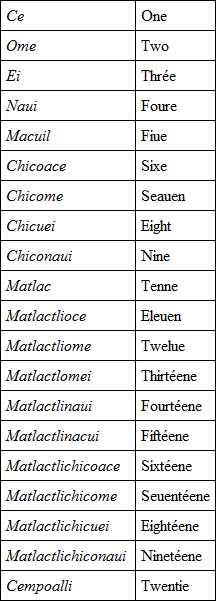
Euery number is simple, vntil you come to sixe, and then they count, six and one, sixe and two, sixe and thrée. Ten is a number by himselfe, then you must counte ten and one, tenne and two, tenne and thrée, tenne and foure, tenne and fiue.
Then you count ten fiue and one, tenne fiue and two, ten fiue and thrée. Twenty goeth by himselfe, and al the greater numbers.
The Mexican yeare
The Mexicans yeare is thrée hundered sixtie dayes, for they haue in their yere eightéene monethes, and euery moneth contayneth twentie dayes. They haue other fiue odde dayes, whiche goeth by themselues, in the which they vsed to celebrate greate feastes of cruell and bloudy sacrifice, with much deuotion. And reconing after this sort, they could not choose but erre, for they could not make equal the punctuall course of the Sunne. Yea the Christian yere is not perfit, although we haue learned Astronomers. But yet these simple Indians wente neare the marke.
The names of the moneths
Tlacaxipeualiztli.
Tozcuztli.
Huei Tozeuztli.
Toxcalt.
Ecalcoaliztli.
Tocuilhuicintli.
Hueitecuilhuitl.
Miccailhuicintli.
Veymiccailhuitl.
Vchpaniztli.
Pachtli.
Huei Pachtli.
Quecholli.
Panquecaliztli.
Hatemuztli.
Tititlh.
Izcalli.
The names of dayes
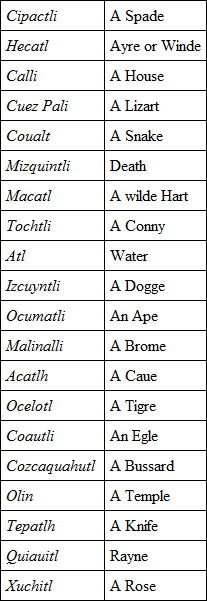
Althoughe these twentie names serue for the whole yere, and are but the dayes of euery moneth, yet therfore euery moneth beginneth not with Cipactli, which is the first name, but as they followe in order, and the fiue odde dayes is the cause thereof. And also bycause theyr wéeke is of thirtéene dayes, which changeth the names, as by example, Cecipactli can go no further thā vnto Matlactlomeiacatl, which is thirtéene, and then beginneth an other wéeke: and we do not say Matlactlinaui Ocelotl, whiche is the fourtéenth day, but we say Ceocelotl whiche is one, and then recken the other sixe names, vnto twenty. And when al the twentie dayes are ended, begin againe to recken from the first name of the twentie, but not frō one, but from viij. And bicause ye may better vndrestand the matter, here is the example.
Cecipactli.
Omehecatl.
Ei Calli.
Naui Cuezpali.
Macuilcouatl.
Chicoacen Mizquinth.
Chicome Macatl.
Chicuei Tochtli.
Chiconauiatl.
Matlaciz Cuintli.
Mailactlioce Ocumatli.
Matlactliome Malinalli.
Matlactlomei Acatlh.
The next wéeke following doth begin his dayes from one. And that one is the fouretéenth name of the moneth and of the dayes, and saith.
Ceocelotl.
Omecoautli.
Eicozcaquahutli.
Naui Olui.
Macuil Tecpatl.
Chicoacen Quiauitl.
Chicome Xuchitl.
Chicoei Cipactli.
In this second wéeke, Cipactli came to fal on the eighte day, being in the first wéeke the first day.
Cemacatl.
Ometochtli.
Eiatl.
Nauizi cunitli.
Macuil Ocumatli.
And so proceede on to the thirde wéeke, in the which this name Cipactli entreth not, but Macatl, which was the seuenth day in the first wéeke, & had no place in ye second, and is the first in the third. This reconing is no darker, than ours, which we haue in a.b.c.d.e.f.g. For they also change with time, and runne in such sort, that .a. whiche was the firste letter of this moneth, commeth to be the fift daye of the nexte moneth, and the thirde moneth he counteth to be the third day, and so orderly doth the other sixe letters.
The accounting of yeares
These Mexicans had another order to recken theyr yeares, which exceded not aboue foure in number, as one, two, thrée, foure, wherewith they accounte a hundred, fiue hundred, a thousand, and as many moe as they lust. Those foure figures or names are, Tochtli, Acatlh, Tecpatlh, Calli, and do signifye, a Conny, a Caue, a Knife, and a House, saying.
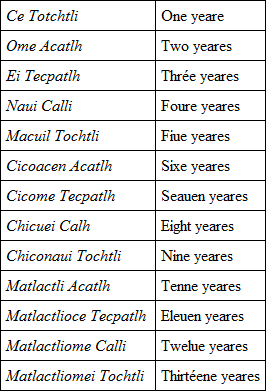
So that the reconing passeth not aboue thirtéene, whiche is one wéeke of the yeare, and endeth where he began.
Another Weeke.
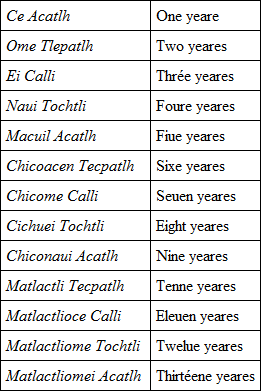
The third vveeke of yeares.
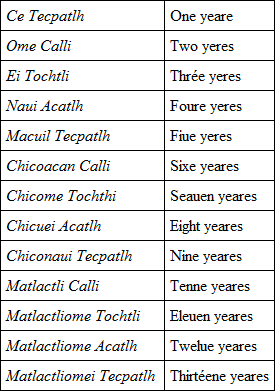
The fourth Weeke.
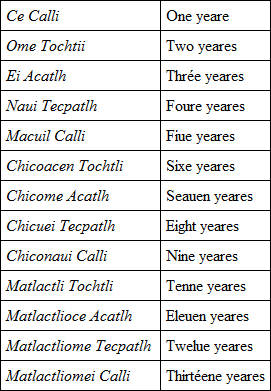
Ech of these wéekes, which our men cal Indition, doth conteyne thirtéene yeares, so that all the foure wéekes make two and fiftie yeares, which is a perfit number in the reconing, and is called the yeare of grace, for from fiftie two yeres, to fiftie two yeares, they vsed to make solemne feastes, with strange Ceremonies, as hereafter shall be declared. And when fiftie two yeares are ended, then they beginne againe, by the same order before declared, vntil they come to as many moe, beginning at Ce Tochtli, and so forwarde. But alwayes they begin at the Conny figure. So that in the forme of reconing they kepe & haue in mēmorye, things of 850. yeares, and by this Cronicle they know in what yere euerye thing hapned, and how long euery king raygned: howe many children they had, and all things else that importeth to the estate of the gouernement of the lande.
The Indians beleeued that fiue ages were past, which they called Sunnes
The Indians of Culhua did beléeue that the Gods had made ye world, but they knew not how, yet they beléeued that since the creation of the world four Sunnes were past, and that the fift and last is ye Sunne that now giueth light to the world.
They helde opinion that the firste Sunne perished by water, and at the same time all liuing creatures perished likewise.
The second Sunne (say they) fell from the heauēs, with whose fall all liuing creatures were slayne, and then (said they) were manye Giantes in that Countrey, and certayne monstrous bones, which our men found in opening of graues, by proportion whereof, some shoulde séeme to be men of twenty spannes high.
The third Sunne was consumed by fire, whiche burned day and night, so that then all liuing creatures were burned.
The fourth Sunne finished by tempest of ayre or winde, which blew downe houses, trées, yea and ye mountaynes and Rockes were blowē asunder, but the lignage of mankinde perished not, sauing that they were conuerted into Apes. And touching the fift Sunne, which now raigneth, they know not how it shall consume. But they say that when the fourth Sunne perished, all the worlde fell into darkenesse, and so remained for the space of fiue and twenty yeares continually, and at the fiftenth yeare of that fearefull darkenesse, the Gods did forme one man and a woman, who brought forth children, and at the end of the other tenne yeares, appeared the Sunne whiche was newly borne vppon the figure of the Conny day, and therfore they begin their account of yéeres at yt day, & reckoning from the yeare of oure Lorde 1552. their age or Sunne is 858. so that it appeareth that they haue vsed many yeares their writing in figures: and they had not onely this vse from Cetochtli, whiche is the beginning of their yeare, moneth, and day of their fifth Sunne, but also they hadde the same order and vse in the other foure Sunnes which were past: but they let many things slippe out of memorie, saying, that with the newe Sunne, all other things should be likewise new. They held also opinion, that thrée dayes after this last Sunne appeared, all the Gods did dye, and that in processe of time the Gods whiche nowe they haue, and worshippe, were borne. And through these false opinions, our Diuines did soone conuert them to the knowledge of the true lawes of God.
The nation of the Indians called Chichimecas
In the lande nowe called newe Spayne, are dyuers and sundry generations of people: but they holde opinion, that the stocke of most antiquitie, is the people nowe called Chichimecas, which procéeded out of the house of Aculhuacan, which standeth beyond Xalixco, about the yeare of our Lorde .720. Many of this Generation did inhabite aboute the lake of Tenuchtitlan, but their name ended by mixture in marriage with other people. At that time they hadde no King, nor yet did builde eyther house or Towne. Their only dwellings was in caues in ye Moūtaynes. They went naked, they sowed no kind of graine, nor vsed bread of any sorte. They did mainteyne themselues with rootes, hearbes, and siluester fruites: and béeing a people cunning in shooting with the bowe, they kylled deare, hares, connyes, and other beastes and foule, which they eate also, not sodden or rosted, but rawe, and dryed in the Sunne. They eate also Snakes, Lizardes, and other filthye beastes, yea and at this day there are some of this generation that vse the same dyet. But although they liued suche a bestiall life, & being a people so barbarous, yet in their diuelish religion they were verye deuout. They worshipped the Sunne, vnto whome they vsed to offer Snakes, Lizards, & such other beasts. They likewise offered vnto their God all kinde of foule, from the degrée of an Eagle, to a little Butterflie. They vsed not sacrifice of māslaughter, nor had any Idolles, no not so muche as of the Sunne, whome they helde for the sole and only God. They married but with one woman, & in no degrée of kinred. They were a stoute and a warlike people, by reason whereof, they were Lordes of the land.
The Coronation of the Kings of Mexico
Although one brother was heire to an other among the Mexicans, and after their deceasse, did inherite the Sonne of the eldest brother, yet they tooke no possession of the state nor name of King vntil they were annoynted and Crowned openlye.

